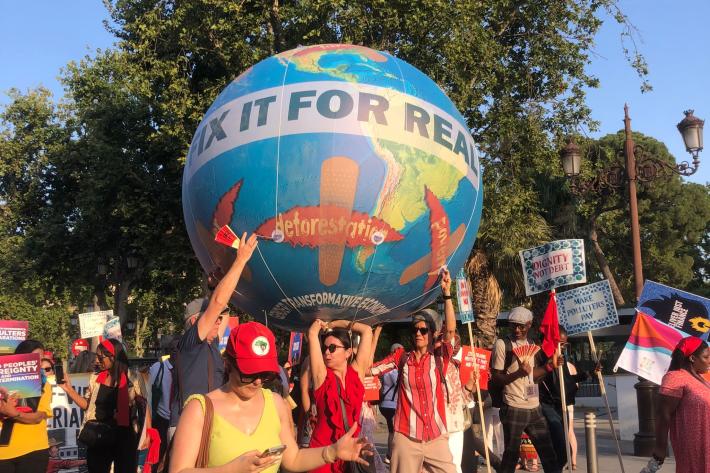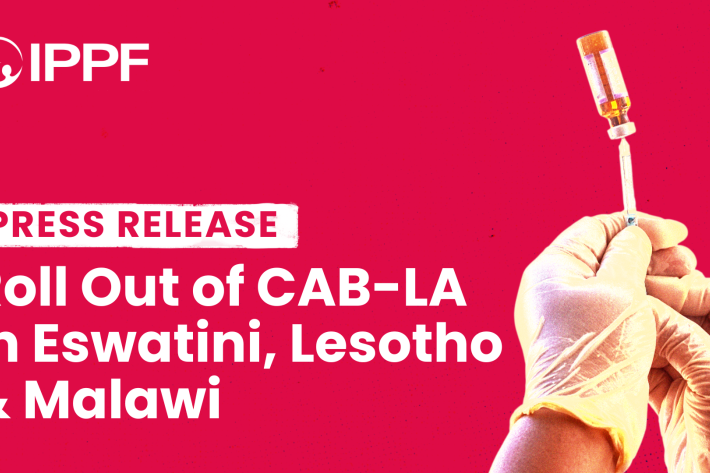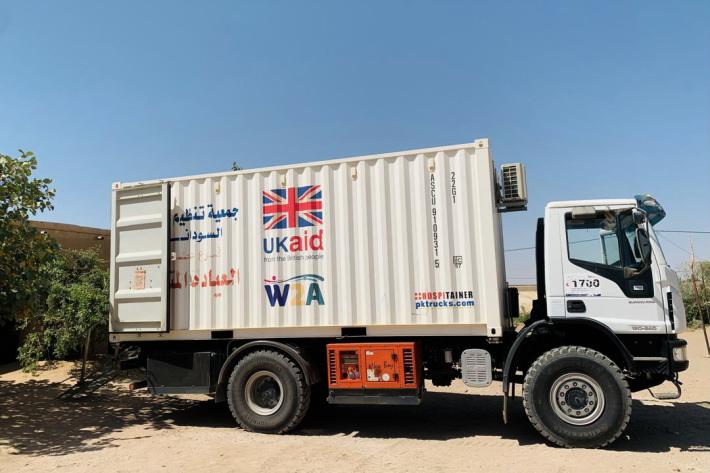Latest press releases
A selection of stories from across the Federation

Zambia, Tanzania, Kenya, Congo, Dem. Rep., Mali
Over 1.4 Million Women and Girls in Africa Left Without Contraception as U.S. Orders Destruction of Global Supply
For immediate release
For media enquiries
Telephone:
+44 7918 845944Email IPPF:
Email: media@ippf.org

| 13 March 2025
IPPF Lebanon Project Receives $500,000 from Japan to Protect Maternal and Reproductive Health
March 13th, 2025 - A new project titled “Preventing Maternal and Reproductive Health Morbidities and Mortalities Among Crisis-Affected Populations, IDPs, Syrian Refugees, and Host Communities in Lebanon” has officially launched. Funded by the Government of Japan and implemented by IPPF Member Association, SALAMA (The Lebanese Association for Family Health), this project aims to enhance and sustain high-quality sexual and reproductive health (SRH) services for Lebanon’s crisis-affected populations Following the ceasefire in Lebanon last year, the need for comprehensive SRH services remains urgent, as many people continue to struggle to access essential maternal, newborn, and reproductive healthcare. Internally displaced people, Syrian refugees, and local host communities in the Beqaa Valley require multifaceted interventions that include not only clinical care but also psychosocial support, medical services, and targeted community outreach. This project addresses these needs by providing quality, clinic-based SRH services for women, youth, and other marginalised groups to reduce SRH-related mortality and morbidity and to improve care for survivors of gender-based violence. Additionally, community outreach and capacity-building programs will empower individuals to make informed decisions regarding their sexual and reproductive health. Key activities include: Clinical services: Offering high quality, rights-based, and client-centered SRH care, including specialised maternal, newborn, and child health services such as safe delivery and newborn care. Distribution of kits: Providing pregnant and postpartum women with ‘mama-baby’ kits, as well as dignity and sanitary kits containing essential hygiene items for key populations. Community outreach: Conducting awareness sessions and collaborative events on SRHR, family planning, gender-based violence, and HIV. Capacity building: Training service providers and peer educators in comprehensive SRHR service delivery and developing educational materials. H.E. Ambassador MAGOSHI Masayuki stated, “Ensuring that crisis-affected communities have access to quality maternal and reproductive health services is a matter of human rights and dignity, hence human security. This initiative reaffirms our commitment to supporting vulnerable populations in Lebanon and underscores the critical importance of sexual and reproductive health to foster resilient communities.” Lina Sabre, Executive Director of SALAMA, noted, “The health and well-being of our mothers, children, and families are paramount. Through this project, we are dedicated to providing life-saving services and empowering communities, even in times of crisis, with the knowledge they need to make informed health decisions.” Dr. Fadoua Bakhadda, Regional Director of the IPPF Arab World Regional Office, added, “This project will be for transformative for women in Lebanon. This funding ensures the continued provision of essential sexual and reproductive healthcare, and the safety for pregnant mothers and newborns." Over the course of this project, it is anticipated that: 28,000 crisis-affected individuals will gain access to essential SRH services, 84,000 SRH service interventions will be delivered, and Nearly 37,000 people will be reached through comprehensive awareness initiatives. About SALAMA SALAMA, the Lebanese Association for Family Health, is an NGO founded in 2008 under the statement of registration No 1740. SALAMA advocates for sexual and reproductive health and rights SRHR by inducing the concerned authorities in Lebanon to support and protect SRHR, promotes and provides high quality SRH services (for children, young people, men and women), and raises awareness for all groups in the society (particularly the underserved and marginalized) in order that they make informed decisions regarding their SRHR. About IPPF Arab World Office International Planned Parenthood Federation (IPPF) Arab World Office: IPPF is a global healthcare provider and a leading advocate of sexual and reproductive health and rights (SRHR) for all. Led by a courageous and determined group of women, IPPF was founded in 1952. Today, we are a movement of over 120 autonomous member associations and 23 collaborative partners with a presence in 146 countries. Established in 1971 the IPPF Arab World Region (IPPF AWR) is one of IPPF’s six regional offices. Based in Tunis, it is the leading Sexual and Reproductive Health (SRH) service delivery organization in North Africa and the Middle East, and the leading Sexual and Reproductive Health and Rights (SRHR) advocacy voice in the region.

| 26 September 2024
IPPF Statement on Escalation of Violence Against Health Care Workers
ENOUGH IS ENOUGH! Nearly a year into targeted, reproductive violence against Palestinian women and girls, and the bombing of our reproductive health site in Gaza; IPPF readies itself for a fresh wave of attacks against its health workers and clinics in Lebanon. "Our healthcare workers in Lebanon are under attack. 70% of them are women. The facilities where women come and access life-saving reproductive services have already been destroyed in Gaza. Now the world is forced to watch another horrific spectacle of the same war crimes being committed in Lebanon.” “We demand all governments - including the U.S., Germany, UK and others - that are supplying these weapons that kill, maim and displace our fellow healthcare workers to stop. We demand an end to the killing of ALL civilians; we will not be silenced, we will continue to collect evidence and talk about these crimes against our collective humanity,” said Dr. Alvaro Bermejo, Director General, International Planned Parenthood Federation. Israel's indiscriminate attacks on Gaza have had devastating consequences for women's reproductive health. The attacks on our own health site, on hospitals and maternal health sites significantly limited access to care. We are experiencing this in Sudan too; clinics destroyed, men’s use of violence against our health workers, and rape used as a weapon of war. In Palestine, obstetric and reproductive violence have been evidenced as a feature of Israel’s violence; we are urgently ringing all alarm bells before these crimes are repeated against women and girls in Lebanon. “Our staff are terrified; they are running for their lives. Contact with our team is limited - health care workers are too scared to use their phones. We fear not just for our colleagues; but for every single woman and girl. Once again, the very essence of humanity is at stake, as though women, children, and all human beings are merely numbers,” said Lina Sabra, Executive Director of IPPF Member Association in Lebanon, SALAMA. Lebanon is experiencing its deadliest days since the country’s civil war ended in 1990. The acceleration in killing over the past few days amid the escalation between Israel and Hezbollah is only made possible by powerful countries with a vested interest in the continuation of this war. We remind all parties that acts of obstetric and reproductive violence have been prosecuted as crimes against humanity.

| 09 March 2022
Statement on the Guatemalan law on 'Protection of the Life and the Family'
On International Women's Day 2022, Guatemala's Congress passed a law which triples the prison sentences for women seeking abortion care, prohibits same-sex marriage and further bans the teaching of comprehensive sexuality education and sexual diversity in schools, saying that teaching "anything other than heterosexuality is normal" is against the law. The "Life and Family Protection Law" was passed by an overwhelming majority of 160 - 8 in the conservative-led Congress, but still needs to be signed by Guatemala's president, Alejandro Giammattei, in order to come into force. Under the new law, women who "have induced their own abortion or given their consent to another person to carry it out" will face a minimum of five years in jail, but the sentences could reach a maximum of 25 years. Abortion is illegal in Guatemala except in cases where the woman's life is at risk. This law is the latest of a series of laws to attack human rights across the country, including gender equality and sexual and reproductive health and rights. The initiative goes against human rights agreements, especially for women and LGBTI+ people and condemns and denies the diversity of families including mono-parental homes. Eugenia Lopez Uribe, IPPF's Regional Director for Americas and the Caribbean Region, said: "It is disturbing that on International Women's Day 2022, the Guatemalan Congress passed a law that completely violates the human, sexual and reproductive rights of women, girls and marginalized people. "While countries across Latin America were celebrating the lives and rights of women, Guatemala has chosen to criminalize those making the best decision for themselves and their families, while also risking imprisoning vulnerable women and girls who have experienced sexual violence or suffered pregnancy loss. By severely limiting access to safe and post-abortion care, the law will undoubtedly lead to an increase in unsafe abortions and a decrease in prenatal care, resulting in life-long disabilities for some women and a rise in maternal deaths. "At the same time, by prohibiting same-sex marriage, limiting comprehensive sexuality education and enabling the discrimination of sexual diversity, the Guatemalan government is creating a society that fosters miseducation, stigma, intolerance and homophobia and fuelling the persecution of LGBTI and non-binary people. "IPPF strongly condemns the passing of this archaic law and demands that the Guatemalan government fulfils international human rights agreements. We stand in solidarity with affected people across Guatemala and the organizations working tirelessly to ensure that all people have the freedom to make their own choices." For media enquiries, please contact Karmen Ivey on kivey@ippf.org or media@ippf.org
















